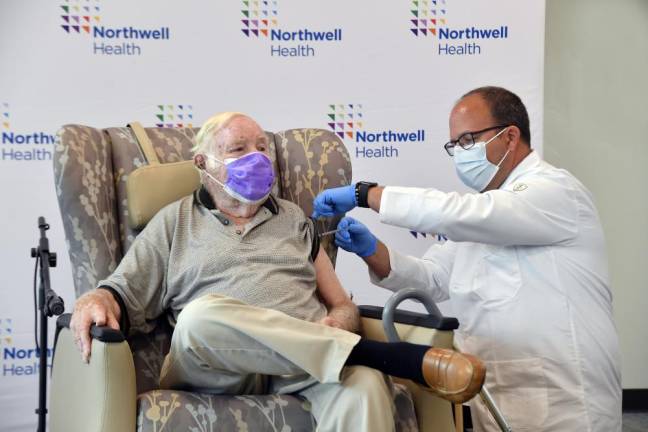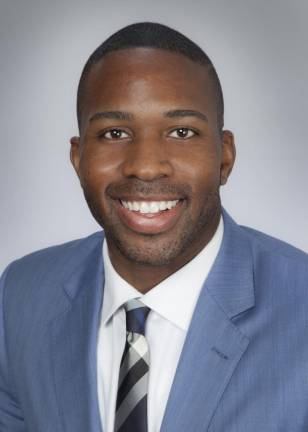Boosters, Third Doses and the Vaccine Confusion
“Different messages are coming from different places,” says a Northwell Health physician


She told the pharmacist the truth.
“I am a rather healthy 66 year-old,” explained the Upper West Sider, fully vaccinated since February. “But I live with a man who is immune-compromised. He got a booster. I feel it would be not good if either one of us got sick.”
Her path to a third dose of COVID-19 vaccine – a dose no health authority has yet authorized for her – ran through the online appointment service of CVS. She answered all the questions honestly, including that she was not immune-compromised, the only vaccinated group currently approved for additional doses in the United States.
“After filling out several screens I got an appointment at the CVS closest to my house,” she reported. The pharmacist sat her in a private corner, behind a screen which did nothing to shield her from her feelings of moral conflict.
“Before we chose which arm, I confessed with a high dose of guilt that I was not immune-compromised and felt terrible If I was taking a shot away from anyone in New York City or anywhere on the globe.”
“The pharmacist, a lovely young woman, reassured me they had plenty of doses,” the West Sider continued. “And they have been giving them out without asking too many questions.”
In the chaos and ethical ambiguities of a global pandemic, these two New Yorkers did the best they could to find their way through.
“It is, unfortunately, a little confusing,” an empathetic expert, Dr. Chidubem Iloabachie of Northwell Health, acknowledged. “Part of the reason for the confusion is different messages are coming from different places.”
The White House says it is planning for Americans to start getting booster shots within a couple of weeks. But neither of the key federal health authorities, the Food and Drug administration and the Centers for Disease Control, have yet signed off on that, and there were protests that the White House was effectively leaning on them to rush their process.
In the meantime, the World Health Organization has told rich nations it is wrong to start giving booster doses in a world where billions haven’t gotten a first jab yet.
“A lot of different messages from a lot of different sources,” Iloabachie summarizes.
Important Distinction
A further complication – the one that opened the door for our morally conflicted West Sider’s visit to the CVS – is that the federal authorities have approved what Iloabachie stresses should be called a third dose, not a booster, to protect those with compromised immune systems.
The distinction is important, Iloabachie explained, because these third doses are for a medical challenge very different from the potential reason for booster shots.
Vaccines prime your immune system to fight a virus. But if your immune system is weak to begin with, for whatever reason, the vaccine may not be as effective as needed. For that reason, some people with weakened immune systems need extra vaccine, the third dose.
Boosters fill a different need. The effectiveness of most vaccines weaken over time. So at some point a booster is needed. Are we at that point? The White House already says yes, but the FDA and CDC are looking at the data, much of it from trials conducted by the drug makers who have been urging booster shots for weeks. Several other countries are already giving booster shots to their citizens.
What our West Sider did was convert the availability of third doses for the immune compromised into an opportunity for a self-prescribed and yet to be authorized booster.
“I certainly understand why people are concerned,” Iloabachie said of those eager to get to the front of the line for a booster shot. “This is one of those cases we would ask for patience while we do the best science.”
Booster doses will likely be both necessary and safe, he said. “The data is compelling,” he added, “But the data is preliminary.”
Jumping the Gun
There was a widespread view among health officials that the Biden administration had jumped the gun and added to the confusion. “I can tell you that the White House announcements were inexplicably made without giving the FDA a chance to do a rigorous data review,” said one public health expert with close ties to the city’s COVID-19 efforts, “and without giving ACIP a chance to evaluate and weigh in.”
ACIP is the CDC’s Advisory Committee on Immunization Practices and plays a crucial role in guiding insurers and state and local health departments.
“Consequently, local public health authorities were blindsided on this,” the city public health expert said. “They weren’t even warned that the White House would be doing this until after the first announcement was made.”
The city health department’s leader on immunization practices, Dr. Jane Zucker, attends both the ACIP and the regular meetings of local health officers with Dr. Anthony Fauci, the president’s chief medical adviser, “and has articulated this concern directly to him” this week, the public health expert said.
Late in the week the leaders of the FDA and the CDC told the White House it should scale back plans for booster shots later this month because the agencies will not have completed regulatory reviews. The White House said it had always meant its plans to be contingent on regulatory approvals.
The confusion from the top pushes decision-making down on individuals and organizations.
Walgreen’s, for example, appears to be stricter in its online appointment system than CVS. While our West Sider told the truth and booked an appointment online through the CVS system, the same answers, submitted to the Walgreens system by a reporter, blocked a booking.
Ultimately, said Iloabachie, “we are relying on an honor system.”
More Coherent Messaging
Vaccination has ticked up in recent weeks, both locally and nationally, as the Delta variant burns through the population, particularly the unvaccinated population. So far, it appears from data and conversations with pharmacists and health workers, that the bulk of those coming in are seeking first doses because their employer has told them they must be vaccinated.
The city health department did not offer a breakdown of how many third doses had been distributed to already vaccinated New Yorkers. Nationally, the CDC says about one million such doses have been administered. What portion of these were to people getting unauthorized boosters versus approved third doses is not clear. But the total is a small fraction of the 375 million total doses so far given.
Iloabachie said his wish, which he doubts will come true, is for more coherent messaging to the public about who really needs extra vaccine, and when.
“If you have a healthy immune system then what I’d say is you can remain confident that your vaccine is still working effectively to keep you from getting severe illness,” Iloabachie said. “But you should be attentive to further notification that a booster may be necessary in the future.”
“I certainly understand why people are concerned. This is one of those cases we would ask for patience while we do the best science.” Dr. Chidubem Iloabachie